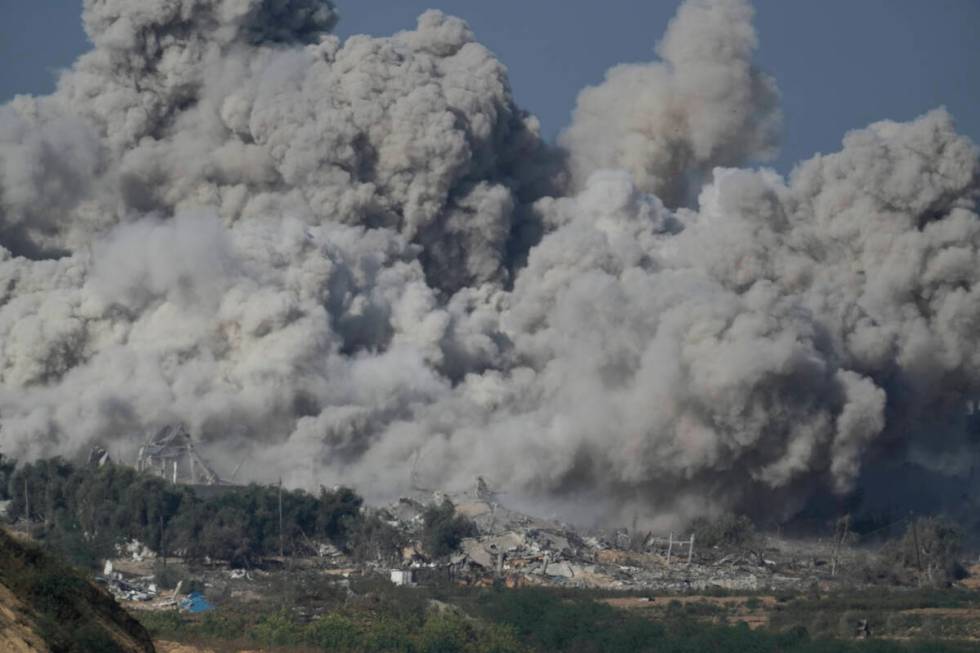Internet, phone networks collapse in Gaza

KHAN YOUNIS, Gaza Strip — Internet and telephone services collapsed across the Gaza Strip on Thursday for lack of fuel, the main Palestinian provider said, bringing a potentially long-term communications blackout.
Meanwhile, Israeli troops for a second day searched Shifa Hospital in the north for traces of Hamas. They displayed guns they say were found hidden in one building, but have yet to release any evidence of the central Hamas command center that Israel has said is concealed beneath the complex.
Hamas and staff at the hospital, Gaza’s largest, deny the allegations.
The latest internet and telephone blackout threatens to last long-term. The main provider, Palnet, said it had run out of fuel to run the network, and Israel has barred entry of new supplies.
Gaza’s fragile communication network has broken down multiple times during the conflict, but each time, Gaza authorities were able to quickly get it back working.
The war, now in its sixth week, was triggered by a wide-ranging Hamas attack into southern Israel on Oct. 7 in which the terrorists killed over 1,200 people, mostly civilians, and captured some 240 men, women and children.
Israel responded with a weekslong air campaign and a ground invasion of northern Gaza, vowing to remove Hamas from power and crush its military capabilities.
More than 11,200 Palestinians have been killed, two-thirds of them women and minors, according to Palestinian health authorities. Another 2,700 have been reported missing, with most believed to be buried under the rubble. The official count does not differentiate between civilian and terrorist deaths, and Israel says it has killed thousands of terrorists.
The war has inflamed tensions elsewhere. On Thursday, gunmen shot and wounded four people at a checkpoint on the main road linking Jerusalem to Israeli settlements in the occupied West Bank.
The three attackers were killed, according to police, who said the assailants had assault rifles, handguns and hatchets, and were preparing a large-scale attack in Jerusalem.
Israeli troops stormed into Gaza’s largest hospital Wednesday.
Troops searched the underground levels of the hospital on Thursday and detained technicians responsible for running its equipment, Gaza’s Health Ministry said in a statement.
After encircling Shifa for days, Israel faces pressure to prove its claim that Hamas used the patients, staff and civilians sheltering there to provide cover for its fighters. The allegation — which the U.S. has said it has intelligence to support — is part of Israel’s broader accusation that Hamas uses Palestinians as human shields.
The military released video from inside Shifa showing three duffel bags it said it found hidden around an MRI lab, each containing an assault rifle, grenades and Hamas uniforms, as well as a closet that contained a number of assault rifles without ammunition clips.
Israeli forces dropped leaflets telling Palestinians in areas east of the southern town of Khan Younis to evacuate and said anyone in the vicinity of terrorists or their positions “is putting his life in danger.” Similar leaflets were dropped over northern Gaza for weeks ahead of the ground invasion.
Two reporters who live east of Khan Younis confirmed seeing the leaflets. Others shared images of the leaflets on social media. The military declined to comment.
Defense Minister Yoav Gallant said Wednesday the ground operation will eventually “include both the north and south. We will strike Hamas wherever it is.”
The military says it has largely consolidated its control of the north, including seizing and demolishing government buildings. Video released by the army Thursday showed soldiers moving between heavily damaged buildings through holes blown in their walls.
The military said it had blown up a residence belonging to Ismail Haniyeh, a senior Hamas leader based abroad. It was unclear if anyone was inside the building.
The worsening fuel shortage threatens to paralyze the delivery of humanitarian services, and Palestinian telecoms provider Paltel said Thursday it caused landline connections, the mobile network and internet connections to shut down.
Gaza has experienced three previous mass communication outages since the ground invasion.
Israel allowed a small amount of fuel to enter Gaza on Wednesday, for the first time since the war began, so that the U.N. agency for Palestinian refugees could continue bringing limited supplies of aid.
The fuel cannot be used for hospitals or to desalinate water, and covers less than 10 percent of what the agency needs to sustain “lifesaving activities,” said Thomas White, the agency’s Gaza director.
———
Chehayeb reported from Beirut. Associated Press writers Amy Teibel and Melanie Lidman in Jerusalem contributed to this report.